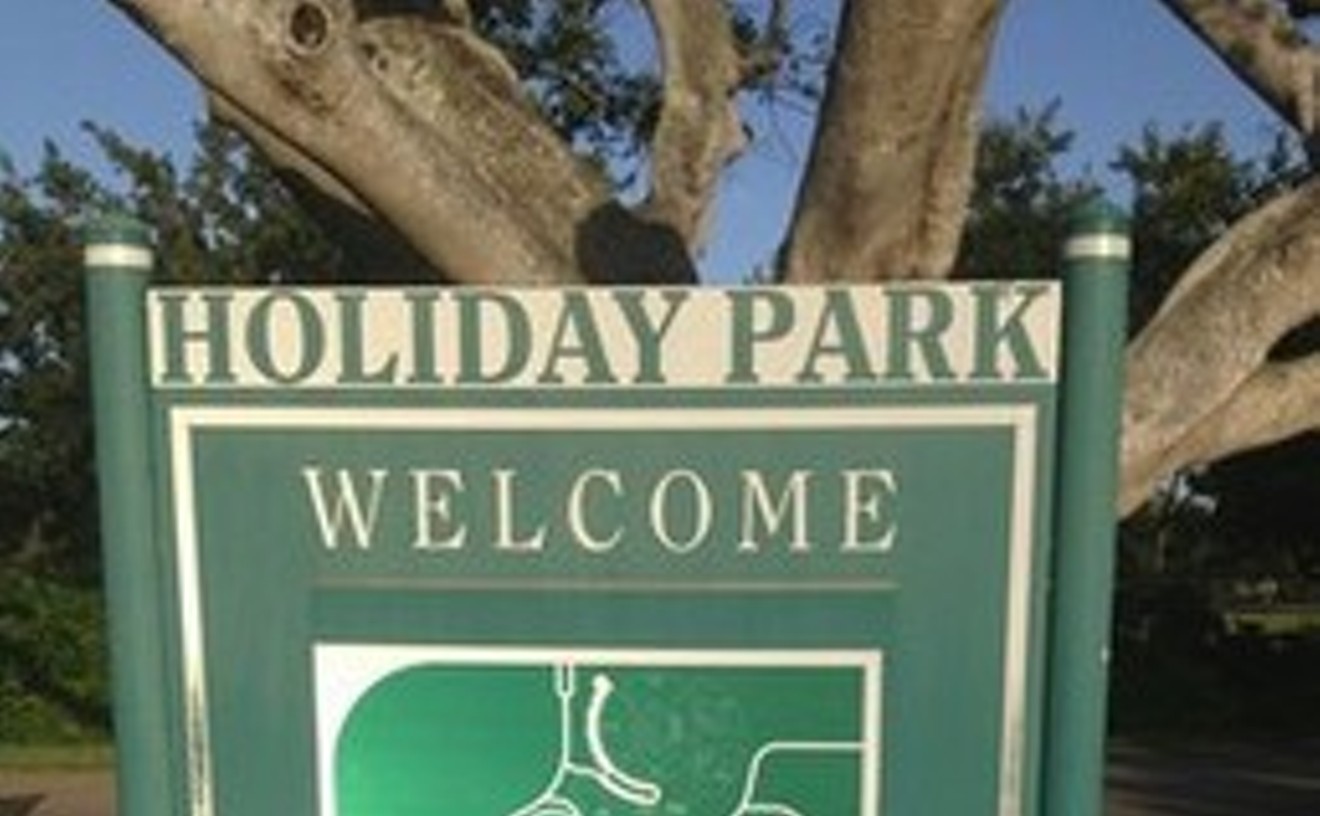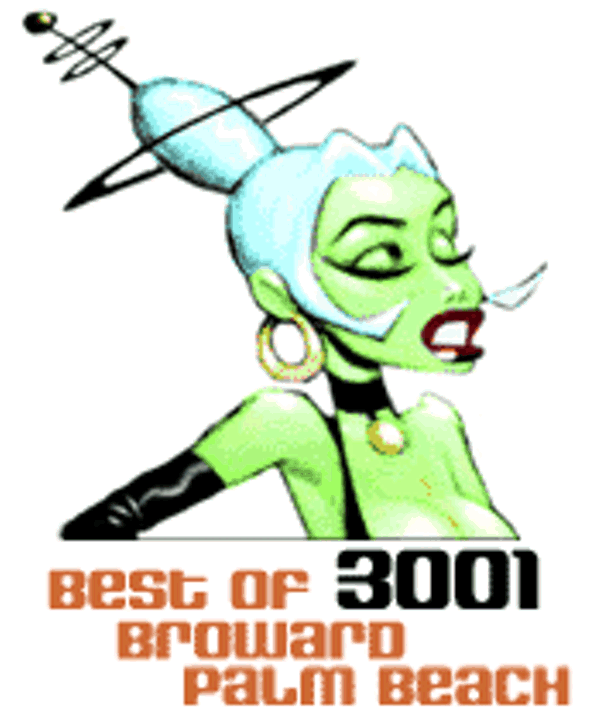Best Mile of Broward/Palm Beach
State Road A1A
Ahh, South Florida. Sun, sand, surf, and shade. Shade? OK, so South Florida, with its wide-open beaches and signature palm trees, isn't exactly renowned for offering lovers of the outdoors much natural relief from the heat -- which is just one of the things that makes a milelong stretch of State Road A1A through the tiny, tony town of Gulf Stream so, well, cool. Along the stretch just north of Delray Beach, drivers and bikers are shrouded by a canopy of spectacular Australian pines that line the oceanfront highway. Can you believe that, if state transportation workers had had their way, the 400 trees would be gone? For years, well-heeled town residents fought to save the 80-year-old trees, which are on the state's hit list because they have a tendency to blow over during hurricanes. In 1996, in response to residents' appeals, the Florida Legislature finally passed a special law that protects this swath of trees from state chain saws in perpetuity. State road officials and environmentalists, who hate the trees because they're not native and crowd out vegetation that is, are still upset that the town won the war of the wood. But when it comes to stuff along the shore that crowds out natives and has a tendency to fall down during hurricanes, trees sure beat condos.
Best Neighborhood Activist
Carl Flick
When he learned last year that Walgreens planned a traffic-magnet, suburban-style store in his funky-chic Northwood neighborhood -- a residential district north of West Palm Beach's downtown -- Carl Flick sounded the alarm. He and his neighbors had spent the last decade pulling Northwood out of a 20-year slump. And while the drug chain's proposed $4 million investment would have been a boost to the area's lagging business district, it would also have meant compromising the neighborhood's New Urbanist master plan. From his post as head of the volunteer Northwood Citizens Planning Committee, Flick used his e-mail expertise and professional savvy (he works as a senior planner for Palm Beach County) to rally the citizenry and stiffen the spines of the city fathers, who drew a line in the pavement and refused the chain's zoning exemption. Just say no to drug stores.
Best Neighborhood Bar
Grady's Bar & Grill
Budweiser baseball caps. Harley-Davidson muscle tees. Drafts for a buck and the juke playing songs about exes in Texas. Welcome to working-class Fort Lauderdale. Culturally far from though geographically near to the silicone-studded and Tommy Hilfiger-clad bodies of Himmarshee Village, Grady's offers working locals a place to toss back a few, watch big-screen TV, and smoke lots and lots of cigarettes. That's a task the bar's owners have taken seriously since the place was opened in 1940. Wood-paneled walls and Busch and Bud Lite chandeliers give the place a homey feel, as does mainstay waitress Jane, who's brought cheeseburgers and suds to regular patrons for 30 years. If you get too rowdy, she'll set you straight. Quick.
Best New Local Celebrity
Jimmy Page
First the former Led Zeppelin guitarist moves to your Las Olas neighborhood. Then the rock god starts showing up at parties, and his wife tries to buy art from your friends. Before long you go to your favorite local bar, and he's there, too, praising your favorite local band. Sheesh. This guy won't leave you alone. You need to chill out, so you go to yoga, but after class, you learn that your yoga instructor is Jimmy's yoga instructor! Maybe Jimmy Page doesn't want to be the best new local celebrity. Maybe he wants to be you.
Best Palm Beach Post Writer
Emily J. Minor
She writes one of those lifestyle columns you instinctively know you're going to hate. It's called "Real Life," but as any discerning newspaper reader knows, anytime a newspaper writer is set loose to write about "family issues," the column is going to be sappy, self-involved, and teeth-grittingly annoying. Emily Minor, however, rises above the my-life-is-so-damned-interesting phenomenon. Yes, her husband and her son are regular fixtures in the column she's been writing since 1995. But more often she leaves her family at home and writes about real people -- from parents watching their mentally handicapped adult child strive for independence, to a prominent doctor insisting that she didn't fully appreciate life until she got breast cancer, to a mother attending a Backstreet Boys concert to deal with her daughter's death. Minor isn't preachy, falsely modest, cloyingly familiar, or overly dramatic. "I'm such a beer-swilling slob," she writes. And you believe her and love her for it. In fact reading her column is a lot like having a beer with a friend who gives you something to think about but isn't offended if you disagree with her views. She's also not averse to stepping down from her lofty perch to write news stories. During the election melee that gripped Palm Beach County this past fall, she wrote profiles of elections supervisor Theresa LePore and county commissioner/canvassing board member Carol Roberts that depicted real women, not the monsters we saw in the national media. Moreover she's proof that in real life, stories don't always have storybook endings. Three years ago a New York literary agent contacted her about writing a book. The agent, Stephen Lord, discovered Jack Kerouac and, in so doing, gave the Beat generation its bible, On the Road. After getting an advance from Harcourt Brace, Minor took a six-month leave of absence to become an author. But when she was done, editors decided not to publish it. "My mom loves it," she says. That's real life.
Best Parade
Mardi Gras Fiesta Tropicale
Every city has a Mardi Gras parade these days. So what separates a good one from a bad one? Access to alcohol, plain and simple. If your city has a Mardi Gras parade yet cracks down on public drinking, your city has a substandard celebration. Hollywood, though, kicks out the jams, combining the best of Carnaval with a little Mardi Gras. The city closes downtown to auto traffic for the big parade, usually the Saturday night before Fat Tuesday, and party people pour into the streets, where they willingly sacrifice their dignity for a few strands of beads. Plus, bars sell beer outside, just like in the Big Easy. After the spectacle passes, make your way to Young Circle and party the night away to live music. Laissez les bons temps rouler!
Best Park
Holiday Park

In the fall peewee football reigns and the smell of popcorn wafts from the concession stand. In winter Latin-American and Haitian teams in brightly colored soccer jerseys take to the field while, on the basketball court, shirts and skins dribble, then dunk. Paths offer biking and skating, an old train locomotive encourages climbing, and ample shelter is available for the days that rain dampens an intimate picnic. At Holiday Park, which was recently renovated, Broward County's white-skirted seniors can find love at the Jimmy Evert Tennis Center; the homeless may unfurl their bedrolls at twilight and enjoy the park's 91.1 acres of respite. And when the downtown skyline is dusted in sunset and framed by green, even a plodding, obligatory jog becomes a holiday indeed.
- 1000 E. Sunrise Blvd., Fort Lauderdale, 33304 Map
- 954-828-5385
- ci.ftlaud.fl.us
Best Parking
CityPlace

Joshua++Prezant
The+sushi+bar+is+the+only+real+nod+to+Asian+influences+at+Mark%27s+CityPlace
Sorry, but not all of us are down with this whole New Urbanism kick. Building ritzy, cookie-cutter cities with hyperexpensive shops and homes doesn't sound like a good way to build a sense of community to us. It sounds more like a refuge for the Thurston and Lovey Howells among us -- and that's exactly what CityPlace has become. Go out there and see the beautiful people strolling along the fake Main Street or dining at Bellagio or shopping at some "art" store full of trinkets that only the two Dons -- Trump and King -- can afford. Our recent visit there was pleasant and the food and drinks were great (at $7 per margarita, they'd better be), but the atmosphere was so bland we started feeling like extras in The Talented Mr. Ripley. Rich white people everywhere. Yuck. If we see another brightly colored sweater wrapped around somebody's waist, we're gonna hurl. But CityPlace does at least one thing oh-so-right: parking. The huge parking garages are wonderfully located a short escalator ride from the action, and amazingly parking is free. That's right. No change, no bills, no crazy-ass chips that you have to cash in afterward. Fort Lauderdale, are you listening?
- 700 S. Rosemary Ave., West Palm Beach, 33401 Map
- 561-835-8580
- cityplace.com
Best Place for Boys to Meet Boys
The Firm Fitness Center
Really, what kind of man are you going to find at a bar? Sure, you'll get lucky -- if you consider a fling with a sallow, flabby, weak barfly lucky. We don't. We want taut buns, bulging biceps, healthy lungs, the whole package. That is why we recommend you skip the bar and try the Firm. We're not saying this is an exclusively gay gym; there is no such thing. But we are saying its strategic location near Victoria Park and not far from Wilton Manors makes it a more likely place than other gyms to meet like-minded bodies. And buff ones at that. Recommended pickup line: "Need a spot?"
Best Place for Girls to Meet Girls
SunTrust Jazz Brunch
It's 11 a.m. on the first Sunday morning of the month, and it's a bright sunshiny day. Call the girlfriends and grab the beach blanket or chairs -- you're going out. It's important to be a little more subtle than you are on Saturday night at the Sea Monster, although almost anyone and anything goes along the New River between the Broward Center for the Performing Arts and Las Olas Riverfront during the SunTrust Jazz Brunch. This is the best place to meet the right kind of girl. As one brunch regular puts it, "The unsavory types are nursing hangovers on Sunday, so they're not here." The cool girls come out in droves because they know that the tunes are good (though not always jazzy), and the people-watching is second to none. The smaller stages, such as the Connie Hoffman Gazebo and the New River Inn stage, provide good music and a few choice secluded and shady spots. Lots of foot traffic means that if you spy someone you like, it's not hard to bump into them "accidentally" and start a conversation about the weather or the music. While chatting, wander over to get a bite to eat from some of the vendors, then invite her over to your blanket in the shade. The rest is up to you.





